×
The Standard e-Paper
Fearless, Trusted News

Sh10 billion has been set aside for the elderly, orphans and other vulnerable members of society, while Sh100 million will go to artists
As the country grapples with the Covid-19 pandemic, public and private sector operations and the lives of wananchi have been disrupted severely. The pandemic continues to take a heavy toll on Kenyans in terms of loss of lives, cost of hospitalisation and/or quarantine, widespread job losses, stagnation of small businesses, decrease in productivity and general uncertainty in the country.